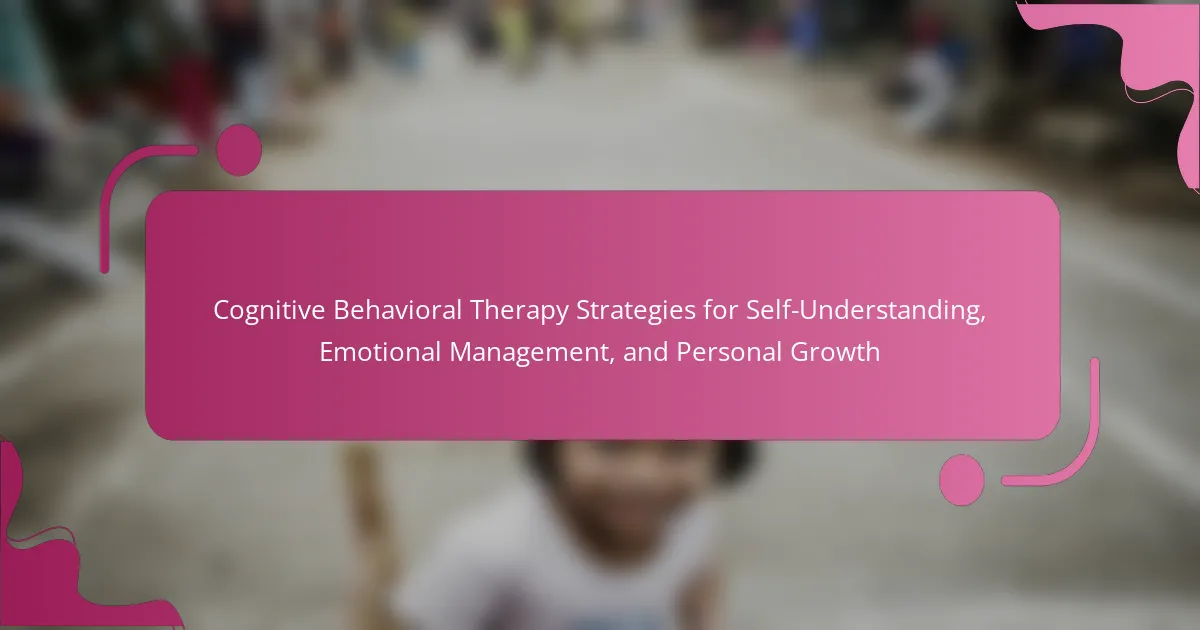Cognitive Behavioral Therapy (CBT) offers effective strategies for self-understanding, emotional management, and personal growth. It promotes awareness of thoughts and behaviors while encouraging the identification of cognitive distortions. Techniques such as cognitive restructuring and mindfulness enhance emotional regulation and resilience. By setting actionable goals, individuals can foster sustained personal development and improve their overall well-being.
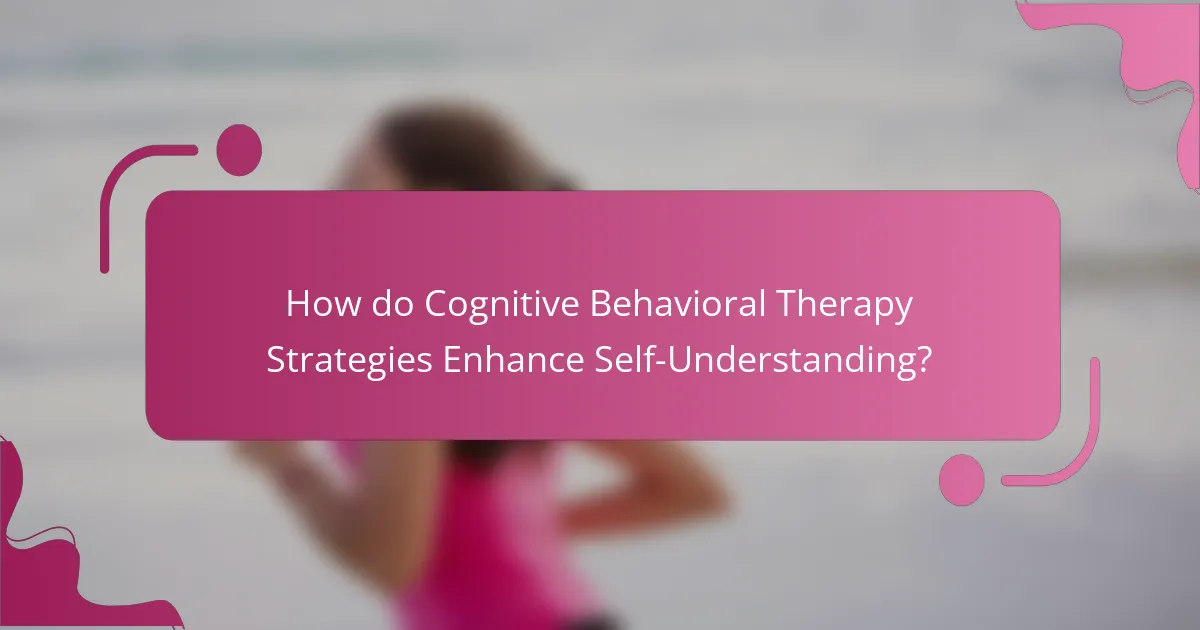
How do Cognitive Behavioral Therapy Strategies Enhance Self-Understanding?
Cognitive Behavioral Therapy strategies enhance self-understanding by promoting awareness of thoughts and behaviors. These strategies encourage individuals to identify cognitive distortions, enabling them to challenge negative thinking patterns. As a result, clients gain insights into their emotional responses and behaviors, fostering personal growth. Techniques like journaling and cognitive restructuring further facilitate self-reflection, leading to improved emotional management. Ultimately, this process cultivates a deeper understanding of oneself and enhances overall well-being.
What are the Key Techniques for Self-Reflection in CBT?
Key techniques for self-reflection in Cognitive Behavioral Therapy (CBT) include journaling, guided imagery, and cognitive restructuring. These practices enhance self-understanding, emotional management, and personal growth.
Journaling allows individuals to document thoughts and feelings, fostering awareness of patterns. Guided imagery helps visualize positive outcomes and coping strategies, promoting emotional regulation. Cognitive restructuring involves identifying and challenging negative thoughts, leading to healthier perspectives.
These techniques collectively empower individuals to navigate their emotions and achieve personal growth effectively.
How Can Journaling Improve Self-Awareness?
Journaling enhances self-awareness by promoting reflection and clarity of thoughts. It helps individuals identify patterns in their emotions and behaviors, leading to better emotional management. Regular journaling can also foster personal growth by encouraging goal-setting and tracking progress. Studies indicate that expressive writing can reduce stress and improve mental health, contributing to a deeper understanding of oneself.
Why is Identifying Cognitive Distortions Crucial for Personal Insight?
Identifying cognitive distortions is crucial for personal insight because it fosters self-awareness and emotional regulation. Recognizing these distortions helps individuals challenge negative thought patterns, leading to healthier responses and personal growth. This process enhances emotional management, allowing for improved relationships and decision-making. Cognitive Behavioral Therapy emphasizes this recognition as a foundation for developing effective coping strategies and achieving lasting change.
Which Role Does Mindfulness Play in Self-Understanding?
Mindfulness significantly enhances self-understanding by promoting awareness of thoughts and emotions. It allows individuals to observe their mental processes without judgment, leading to deeper insights about their behaviors and motivations. By practicing mindfulness, one can identify patterns in emotional responses, which is crucial for effective emotional management. This awareness fosters personal growth by encouraging reflection and self-discovery. As a result, mindfulness serves as a foundational strategy in cognitive behavioral therapy, aiding individuals in navigating their emotional landscapes and achieving greater self-awareness.
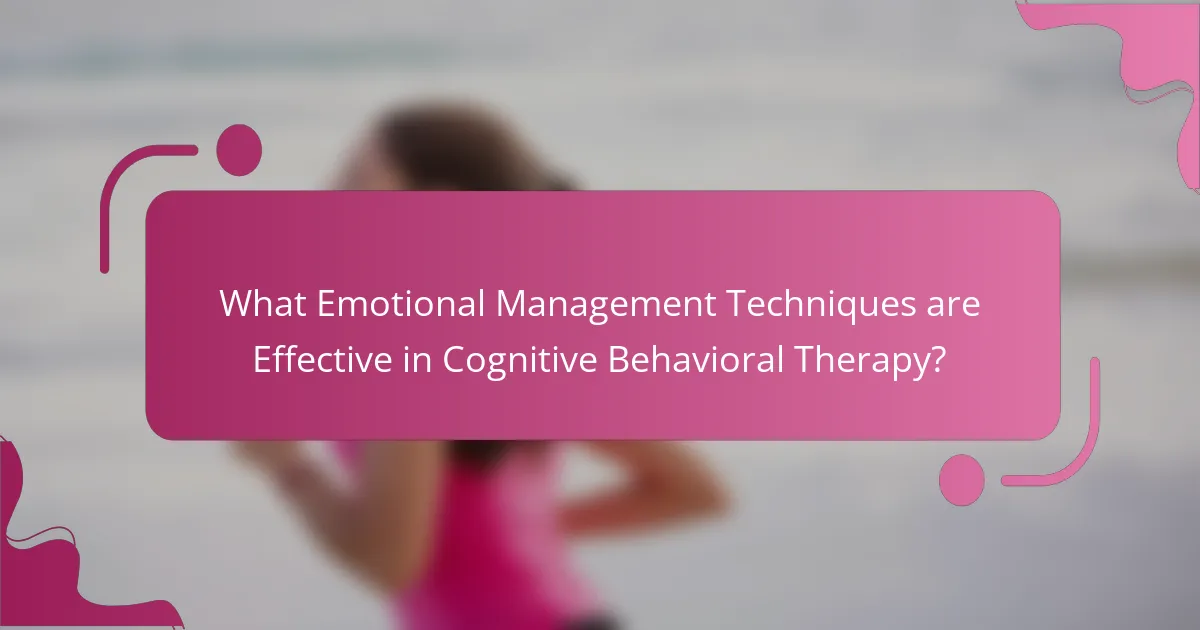
What Emotional Management Techniques are Effective in Cognitive Behavioral Therapy?
Effective emotional management techniques in cognitive behavioral therapy include cognitive restructuring, mindfulness practices, and behavioral activation. Cognitive restructuring helps individuals identify and challenge negative thought patterns. Mindfulness practices enhance emotional awareness and regulation. Behavioral activation encourages engagement in activities that improve mood and promote positive emotions. These techniques support self-understanding and personal growth by fostering resilience and emotional intelligence.
How Can CBT Help in Regulating Emotions?
Cognitive Behavioral Therapy (CBT) effectively aids in regulating emotions by providing strategies for self-understanding and emotional management. CBT teaches individuals to identify and challenge negative thought patterns, which can lead to emotional distress. This process promotes healthier emotional responses and enhances personal growth.
CBT employs techniques such as cognitive restructuring, which involves recognizing distorted thinking and replacing it with more balanced thoughts. Mindfulness practices integrated into CBT help individuals stay present and manage overwhelming emotions. As a result, clients often report improved emotional regulation and resilience.
Research indicates that CBT can significantly reduce symptoms of anxiety and depression, which are commonly linked to emotional dysregulation. Studies show that up to 60% of individuals experience positive changes in emotional management after completing CBT programs. This highlights CBT’s effectiveness as a tool for emotional well-being.
What Strategies are Used to Challenge Negative Thoughts?
Cognitive Behavioral Therapy (CBT) employs various strategies to challenge negative thoughts effectively. These include cognitive restructuring, thought records, and behavioral experiments.
Cognitive restructuring helps individuals identify and alter distorted thinking patterns. Thought records encourage tracking negative thoughts and evaluating their validity. Behavioral experiments test the beliefs underlying negative thoughts through real-life situations.
These strategies promote self-understanding, emotional management, and personal growth, leading to improved mental well-being.
How Does Behavioral Activation Improve Emotional Well-Being?
Behavioral activation enhances emotional well-being by encouraging engagement in meaningful activities. This approach shifts focus from negative thoughts to positive actions, fostering a sense of accomplishment and connection. Research shows that consistent practice can lead to significant reductions in depression and anxiety symptoms. By promoting physical activity and social interactions, behavioral activation effectively improves mood and overall emotional health.
Which Coping Mechanisms are Recommended in CBT?
Cognitive Behavioral Therapy (CBT) recommends several coping mechanisms to enhance self-understanding and emotional management. Key strategies include cognitive restructuring, which involves identifying and challenging negative thoughts, and behavioral activation, encouraging engagement in enjoyable activities. Mindfulness techniques promote present-moment awareness, while problem-solving skills help address specific challenges. Additionally, exposure therapy gradually confronts fears to reduce anxiety. These mechanisms support personal growth by fostering resilience and adaptive coping skills.
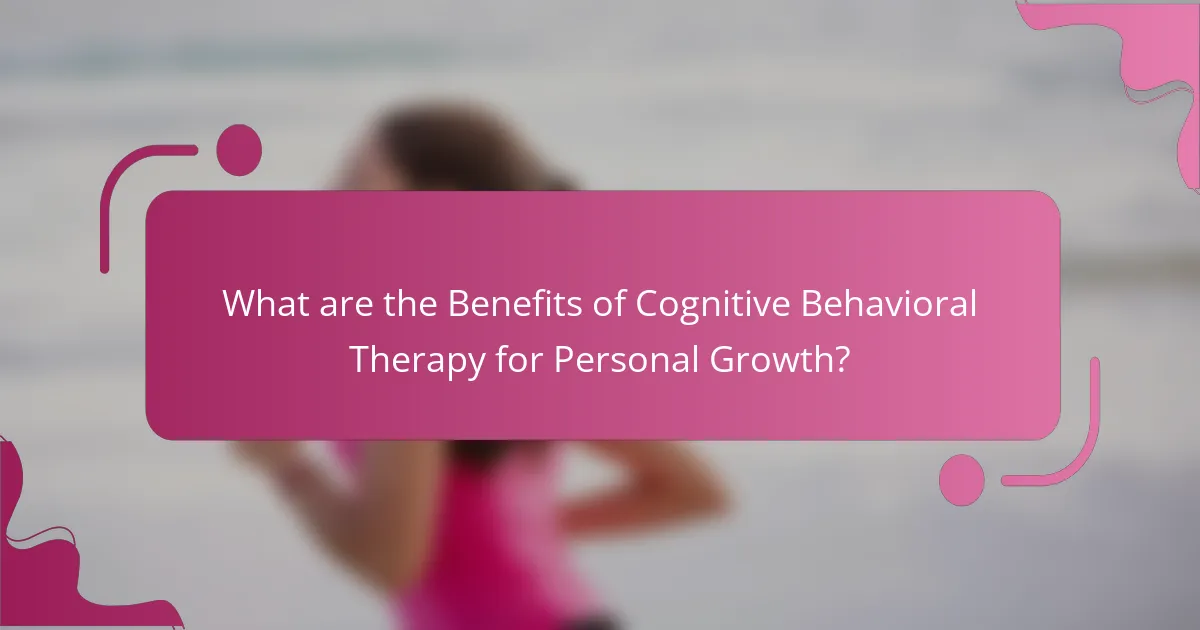
What are the Benefits of Cognitive Behavioral Therapy for Personal Growth?
Cognitive Behavioral Therapy (CBT) enhances personal growth by improving self-understanding, emotional management, and resilience. It provides practical strategies to identify and challenge negative thought patterns, fostering healthier behaviors.
CBT encourages self-reflection, enabling individuals to recognize their triggers and responses. This awareness leads to improved emotional regulation, allowing for better coping mechanisms during stress. As a result, personal growth is facilitated through increased self-efficacy and motivation.
Additionally, CBT emphasizes goal-setting, which helps individuals create actionable plans for their personal development. By breaking down larger goals into manageable steps, individuals experience a sense of accomplishment, further promoting growth.
Lastly, CBT’s structured approach provides tools for ongoing self-assessment, encouraging continuous improvement and adaptation in one’s personal journey. This adaptability is a unique attribute that distinguishes CBT from other therapeutic approaches.
How Can Goal Setting Drive Personal Development in CBT?
Goal setting significantly enhances personal development in Cognitive Behavioral Therapy (CBT) by providing direction and measurable progress. It allows individuals to identify specific emotional management strategies and self-understanding goals. By setting clear objectives, clients can track their growth, which reinforces positive behaviors and coping mechanisms. This structured approach fosters accountability and motivation, essential for personal growth in therapy. As a result, goal setting becomes a powerful tool in transforming thoughts and actions, leading to lasting change.
What Role Does Feedback Play in the Growth Process?
Feedback is essential for growth as it provides insight into behaviors and emotional patterns. In Cognitive Behavioral Therapy, feedback helps individuals recognize thought distortions and triggers. This awareness fosters emotional management and promotes personal growth. Constructive feedback encourages reflection, enabling adjustments to maladaptive behaviors, ultimately leading to healthier responses and improved self-understanding. Regular feedback loops can enhance motivation and commitment to personal development, reinforcing positive changes over time.
How Can CBT Foster Resilience and Adaptability?
Cognitive Behavioral Therapy (CBT) fosters resilience and adaptability by teaching individuals to reframe negative thoughts and develop coping strategies. This process enhances self-awareness and emotional regulation, allowing for better responses to stress and challenges. CBT encourages a growth mindset, promoting personal development through practical techniques such as cognitive restructuring and exposure therapy. These strategies empower individuals to face adversity with confidence and flexibility, ultimately leading to improved mental health and well-being.

Which Unique Attributes of CBT Strategies Contribute to Lasting Change?
Unique attributes of Cognitive Behavioral Therapy (CBT) strategies that contribute to lasting change include their focus on cognitive restructuring, behavioral activation, and skills training. These elements empower individuals to identify and challenge negative thought patterns, engage in positive behaviors, and develop coping mechanisms.
Cognitive restructuring helps clients reframe their thoughts, promoting a more positive outlook. Behavioral activation encourages engagement in enjoyable activities, enhancing mood and motivation. Skills training equips individuals with practical tools for emotional regulation and problem-solving, fostering resilience.
Together, these unique attributes create a comprehensive approach that supports sustained personal growth and emotional management. This multifaceted strategy leads to lasting change by addressing both cognitive and behavioral aspects of mental health.
How Does Customization of CBT Techniques Address Individual Needs?
Customization of CBT techniques directly addresses individual needs by tailoring strategies to personal experiences and goals. This personalized approach enhances self-understanding, emotional management, and personal growth. For instance, therapists can modify cognitive restructuring methods based on a client’s unique thought patterns, making interventions more effective. Additionally, incorporating individual coping styles into behavioral activation can lead to better engagement and outcomes. By recognizing each client’s distinct attributes, such as their emotional triggers or resilience levels, CBT becomes a more impactful tool for transformation.
What Innovative Approaches are Emerging in CBT Practice?
Innovative approaches in Cognitive Behavioral Therapy (CBT) are focusing on personalized strategies that enhance self-understanding and emotional management. Techniques such as mindfulness integration, digital CBT tools, and neurofeedback are gaining traction.
Mindfulness integration combines traditional CBT with mindfulness practices, helping individuals become more aware of their thoughts and emotions. Digital CBT tools provide accessible platforms for self-guided therapy, allowing for flexibility in practice. Neurofeedback offers real-time data on brain activity, facilitating targeted emotional regulation.
These approaches emphasize individualized treatment plans, enhancing personal growth through tailored interventions. As a result, clients experience improved coping skills and emotional resilience.

What Common Challenges Might Individuals Face When Implementing CBT Strategies?
Individuals may face several challenges when implementing cognitive behavioral therapy (CBT) strategies. Common issues include difficulty in recognizing negative thought patterns, resistance to change, and emotional discomfort during the process.
Many people struggle to consistently apply CBT techniques in daily life, leading to frustration. Lack of immediate results can also discourage commitment to the practice. Additionally, some individuals may find it hard to confront underlying issues that CBT aims to address, causing avoidance behaviors.
Support and guidance from a therapist can help mitigate these challenges, enhancing the effectiveness of CBT strategies for self-understanding, emotional management, and personal growth.
How Can Resistance to Change Affect the CBT Process?
Resistance to change can hinder the effectiveness of Cognitive Behavioral Therapy (CBT) by obstructing personal growth and emotional management. Clients may struggle to adopt new thought patterns and behaviors, limiting their progress. This resistance can stem from fear of the unknown or discomfort with vulnerability. As a result, therapists must employ strategies to address these barriers, fostering a supportive environment that encourages openness and exploration. Overcoming resistance is essential for achieving meaningful outcomes in the CBT process.
What are the Most Frequent Misconceptions About CBT?
Cognitive Behavioral Therapy (CBT) is often misunderstood. Common misconceptions include the belief that CBT is solely about positive thinking, that it is a quick fix, and that it is only for severe mental health issues. Many think CBT ignores emotions, but it actually integrates emotional awareness into its strategies. Another misconception is that CBT is a one-size-fits-all approach; in reality, it is tailored to individual needs and circumstances. Misunderstandings about CBT can hinder its effectiveness in promoting self-understanding, emotional management, and personal growth.
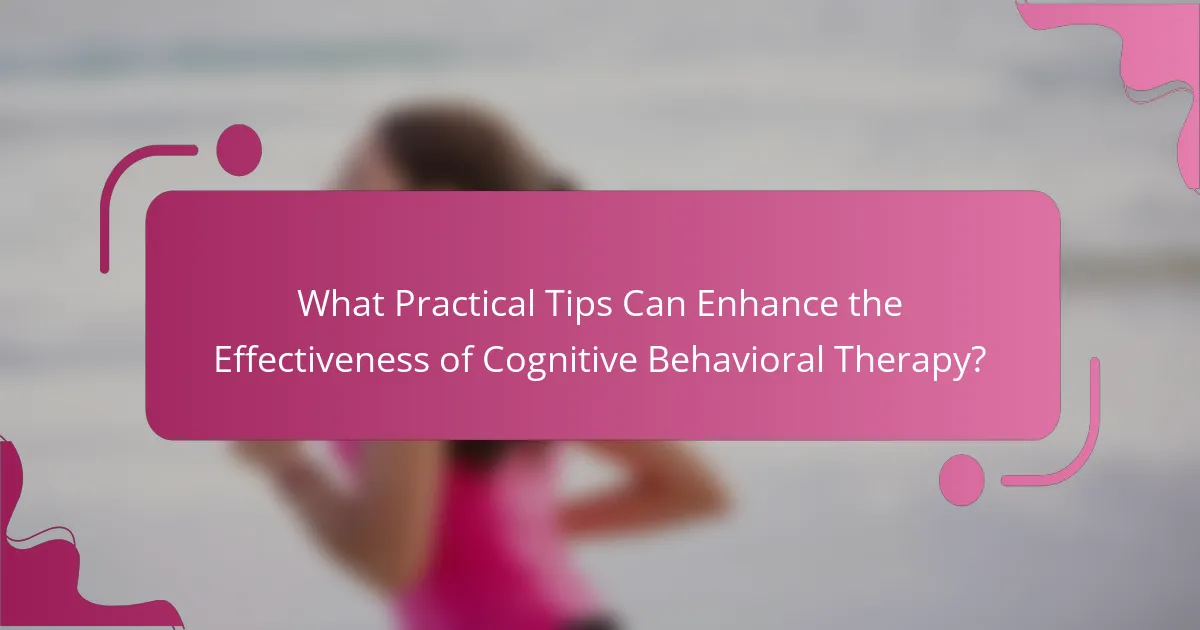
What Practical Tips Can Enhance the Effectiveness of Cognitive Behavioral Therapy?
Practical tips to enhance Cognitive Behavioral Therapy (CBT) effectiveness include consistent practice, setting specific goals, and maintaining a journal. Regularly applying CBT techniques reinforces learning and promotes self-awareness. Setting measurable goals helps track progress, while journaling aids in reflecting on thoughts and emotions. Engaging in these practices fosters emotional management and personal growth.
How to Create a Supportive Environment for CBT Practice?
Creating a supportive environment for Cognitive Behavioral Therapy (CBT) practice involves fostering trust, safety, and open communication. Start by establishing a comfortable space free from distractions. Encourage regular check-ins to assess emotional states and progress.
Incorporate supportive tools such as journals for reflection and mindfulness practices to enhance emotional management. Promote collaboration by involving family or friends, which can create a network of encouragement. Lastly, ensure accessibility to resources that reinforce CBT strategies, such as workshops or literature, to facilitate personal growth.
What are the Best Practices for Maintaining Progress After Therapy?
To maintain progress after therapy, implement cognitive behavioral therapy strategies consistently. Establish a routine for self-reflection, practice emotional regulation techniques, and set achievable personal growth goals.
1. Regularly journal thoughts and feelings to enhance self-understanding.
2. Use cognitive restructuring to challenge negative beliefs.
3. Engage in mindfulness exercises to improve emotional management.
4. Set specific, measurable goals for personal development.
5. Seek support from peers or support groups to reinforce progress.
Which Resources Can Support Ongoing CBT Learning and Application?
Various resources can enhance ongoing Cognitive Behavioral Therapy (CBT) learning and application. Books, online courses, and support groups provide valuable insights and practical strategies.
Books like “Feeling Good” by David D. Burns offer foundational knowledge and techniques. Online platforms such as Coursera and Udemy feature courses led by experienced therapists, facilitating flexible learning. Support groups, both in-person and virtual, foster community and shared experiences, enhancing emotional management skills.
Incorporating these resources can deepen understanding and promote personal growth through consistent practice of CBT strategies.
